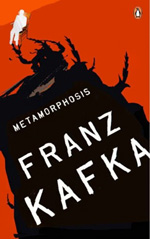
![]() jynnantonnyx
jynnantonnyx
1/2/2013
![]()
Franz Kafka's novella The Metamorphosis exists in the same terrifyingly absurd sort of world as so many of his other stories. His characters are often oppressed by isolation and a sense of futility, and as such the horror they experience is part and parcel with the very act of living. In his novel The Trial, for instance, Josef K. is arrested and prosecuted for a crime unknown not only to the reader but to himself. Many of Kafka's stories exist on the borders of madness and despair, something most Horror writers can only dream of accomplishing in their own work.
The Metamorphosis is a strangely-layered work pulling out of many literary traditions, but still seemingly unique. The title, for instance, is a reference to Ovid's Metamorphoses, an ancient Roman work that retells Greek myths to make the philosophical point that all things are in a state of flux and transformation. The mutation of traveling salesman Gregor Samsa into a giant insect is reminiscent of werewolf stories… well, except for the insect part. The suddenness and unexplained nature of the mutation is a feature of absurdist and postmodern art, which has it that the world (contra Aristotle) is intrinsically irrational and chaotic. The unkindness of Gregor's family as they fail to adjust to his curse is evocative even of the crueler sort of European fairy tales.
But despite all this, there is nothing that can quite prepare the reader for a story which describes the protagonist's plight in this way: "His numerous legs, which were pitifully thin compared to the rest of his bulk, waved helplessly before his eyes." It manages to be both disgusting and terrifying at the same time, something the Splatterpunk subgenre rarely achieves. Gregor's attempts to move and talk in his new, inhuman body are pitiful, making one want to weep and vomit simultaneously. His family is uncertain whether this giant insect is still their son, though because of our privileged point of view, we know that he is. Only after his father has crippled him do they allow him to venture out of his room now and then. I won't ruin the ending, but you wouldn't be wrong to guess that it's not a happy one.
I'll close with a brief passage, one which is fairly typical of Kafka's writing. Good luck eating dinner afterwards!
Then he set himself to turning the key in the lock with his mouth. It seemed, unhappily, that he hadn't really any teeth—what could he grip the key with?—but on the other hand his jaws were certainly very strong; with their help he did manage to set the key in motion, heedless of the fact that he was undoubtedly damaging them somewhere, since a brown fluid issued from his mouth, flowed over the key, and dripped on the floor.
(Translations by Willa and Edwin Muir)
http://blog.worldswithoutend.com/2011/10/month-of-horrors-the-metamorphosis/